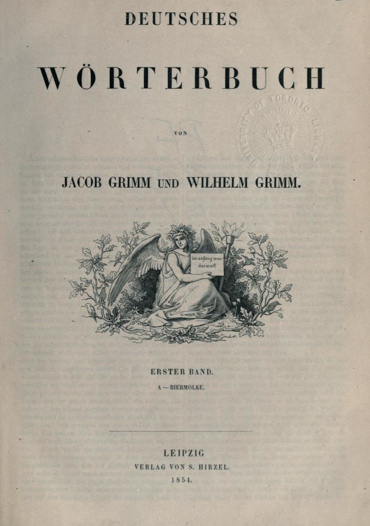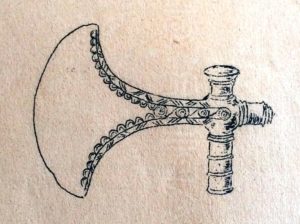2nd research report by Heinz Axthelm, March 1938.
1. The spelling of the name Axthelm in the present and the past. Delimitation against names of other origin.
a) Currently there is only one spelling of the name, namely Axthelm. The frequently occurring surnames Axt, Axmann, Axtmann, Axthalb (Bavaria), Axter (Vienna) etc. only have etymological similarity or a correspondence of a syllable with the Name Axthelm in common, but not the etymological origin. That means, the interpretation or the meaning of the name Axthelm is quite unique, and does not repeat in the other names with similar spelling.
Thus I note that only the bearer of the name Axthelm belong to a common name group. The other ones are excluded from this consideration.
Since the word Axhelm or Axthelm formed, the bearers of this name belonged to a certain related group (to a common lineage), while all other names with the syllable Axt took their own courses. Controversial is so far only the origin of the name Axthalb, which occurs in Bavaria, Germany.
Axthalb: cath. German Knighthood […], nobility recorded on 8th January 1813 in the nobility register of the Bavarian Kingdom […].
We therefore temporarily leave this name outside of consideration.
b) The spelling Axthelm reaches back to the end of the Thirty Years’ War (mentioned for the first time in 1672 in the Bachra church register and 1628 in the Rettgenstedt church register), in contrast, the Name Axhelm without “t” is mentioned last time 1631 in the Bachra churches register and again in 1665 in the church register of Olbersleben. From this time back, our name only appears in the spelling Axhelm (22 times in the Bachraer church register 1591-1631, in the Hardisleben military register 4 times only in the year 1555; the appearance in the church registers of Ostramondra, Rettgenstedt, Lossa, Olbersleben, Neuhausen, etc. is not noted because the oldest church records of these places are of earlier date).
c) The names Anshelm, Ansehelm and Anselm, which already existed in the 6th century, have no etymological relationship with the name Axthelm. The name of the Bishop of Bomarzo (Anselm of Polymartium) mentioned in the year 545 AD leads undoubtedly to the meaning “God’s helmet”; the same counts for the Bishop of Cremona living around the year 600 AD. Likewise the spelling Anshalm (from the year 1033 and 1085) has nothing to do with our name. Otherwise it is the question, whether the early Gothic name Agshelm or the late Gothic name Oshelm (modern high German = Anselm?) has a common origin with the name Axhelm. The citizen called Anselmus in a Speyer certificate (1003 AD) and in the Strasbourg register (965-991 AD) just lead back to the older lineage Ansehelm.
2. The etymological study of the name Axthelm
I act on the assumption of the spelling Axhelm, because it is the oldest known spelling.
First, a purely linguistic outline: The syllable -helm, which has no relation to the word helmet as a head covering hat, comes from the Old High German parlance and occurs for the first time in the end of the 9th century in the spelling halap. Around the year 1000, the 2nd vowel is canceled in the vernacular, so from that time on in the Middle High German language the forms halp, help, halm and helm occur in the meaning: “stalk” (see Grimm and Gottschald).
A branch of this spelling is the syllable halb, which still today is common in the surname Axthalb.
One far more complex development made the syllable Axt/Ax. The common Germanic word, which goes back to a device-name, is based on the Indo-Germanic agesi or agzi (aksi); the related Greek word is axinä (ax), Latin = ascia. (On the other hand the words acies = the sharpness (Latin) and akä = the tip (Greek) are not related with the word Axt, neither acri = cutting edge)
The Indo-Germanic agesi appears in the Gothic again as = agizi and appears in Old High German as acchus, plural acchussi and in Middle High German in the form ackes (cf. Old Saxon accus; Nordic = aaks, from akes; Anglo-Saxon = aex; English = ax, axe; and Norse = ox).
The Middle High German ackes = the ax is mentioned in 1257 in Strasbourg: House “zur Ackes”.
Out of the Middle High German ackes develops the Late Middle High German aks/ax (ks to x, see also in Latin and Greek), or axt (1352 Peter with the Ax – 1362 = Peter Ax) [see Heintze-Cascorbi].
Even Martin Luther used the form axt, but in the Middle High German language of Switzerland achszt is used (see Fischart and agst see Keisserberg; cf. the in the Early Gothic occurring first name Agshelm).

Here is a shortened translated excerpt from the German dictionary of Grimm, see Axthelm:
= manubrium asciae (lat.) ie. handle of the ax / […] a stalked ax
[…] should not express that ax splits helmets […]
Keisserberg adds:
“[…] so adelung’s assumption is wrong, that axthelm is the rear thick part (the eye) of the ax in which the stalk is fastened.”
It is clear from all this that the name Axthelm originally belongs to the device-names and points out to an activity, which could correspond to that of a carpenter, which has been common under Henry the Fowler and the Saxon emperors. Both the etymological interpretation of axt and helm, as well as the combination of both, is now obvious. In the Middle High German sayings, the word helm appears equally in neutral as in male meaning, but both times it has the same sense.
The widespread opinion that the ending -helm is identical with the term helmet as a headgear, lacks any basis and is an erroneous interpretation. Of course it is not to be dismissed, that in time before the Christianization of Germania (at the turn of our era; see Tacitus, Germania!) the blade of the ax was fixed to the upper end of the handle by a wrought hood and was named after this ax hood which looked similar to a warrior’s headgear. But the much later emerged surname Axthelm has no connection with it (cf. Gottschald and Leinertz with Grimm).

So the tool “Axthelm” ( = Ax-handle) gave this handicraft as such its name and later also the practitioners of this craft were named with the same name: Axthelm.
This is simply the explanation of our name. Apart from the historical demonstrations, also all these investigations sum up, that the origin of our lineage is to be sought in Germany, not in Sweden.
Eilenburg, March 1938. Heinz Axthelm


 Deutsch
Deutsch